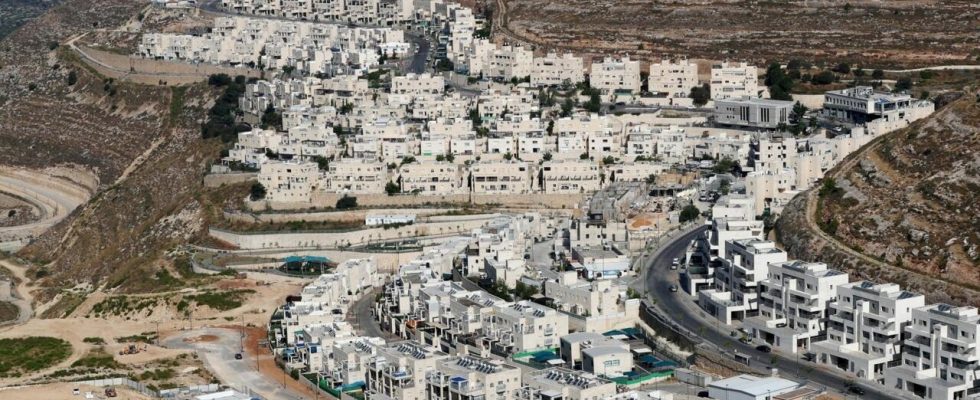Historic hearings open this Monday, February 19 before the International Court of Justice (ICJ). Fifty-two states are preparing to defend their positions on 56 years of Israeli occupation of the Palestinian territories and on the consequences of this policy.
Published on :
5 mins
With our correspondent in The Hague,
It is a new six-day war, legal this time, which opens before the International Court of Justice (ICJ). Ministers, diplomats and lawyers from fifty-two countries and three international organizations will participate from February 19 to 26, 2024, at the Peace Palace in The Hague where the fifteen judges of the world court sit. The highest court of the UN must examine the roots of the Israeli-Palestinian conflict.
If this procedure is not linked to the case filed at the end of December by South Africa, accusing Israel of committing genocide against the Palestinians of Gaza, the war opposing Israel to Hamas since October 7 will undoubtedly arise. in the pleadings. While Israeli Prime Minister Benjamin Netanyahu wants to make this war a global fight against terrorism, the hearings organized before the world court will inevitably place this final episode in the broader context of the Israeli-Palestinian conflict.
Israel will not plead in The Hague
The appeal to the ICJ dates back to December 30, 2022. On that day, the UN General Assembly asked this Court to provide legal advice on the legality or illegality of the Israeli occupation, and on its consequences. . Two questions are then submitted to the fifteen judges, who will have to say which are “ the legal consequences of Israel’s violation of the Palestinian right to self-determination, its occupation, its colonization and its prolonged annexation of Palestinian territory since 1967 “.
The volunteer states submitted written briefs to the court in July 2023, well before the October 7 attacks perpetrated by Hamas, and the reprisals that followed. Only a few states provided a reply before the court’s October 25 deadline. The court therefore proceeds from Monday to the last round of pleading, viva vocce this time.
But Israel will not come to plead at the Peace Palace. The Jewish state is against this procedure. He claims that it aims to “demonize” Israel and that resolving the conflict is not the business of international justice. On Monday February 19, the Palestinians will have three hours to plead their case. Then until February 26, the volunteers, that is to say the 51 other States and the three multilateral organizations – African Union, Arab League and Organization of the Islamic Conference (OIC) – will succeed one another at the desk placed in front of the judges , for short pleadings of 30 minutes.
A pleading by proxy
If the Jewish state refuses to appear at The Hague, several countries will nevertheless defend its positions, including its closest allies, the United States, the United Kingdom and Canada. Israel’s three allies assure that the hearings could harm negotiations on the future of the occupied territories. They ask the judges not to answer in detail, either on the status of the territory, or on these borders. The Palestinians and their allies, who will be more numerous than the opposing party in The Hague, are instead asking them for a precise answer.
For six days, through the pleadings of Algeria, South Africa, Jordan, Ireland and others, the ills resulting from the occupation will be truly examined: apartheid, forced displacement, self-determination, resources natural, status quo on the holy city, annexation of Jerusalem, impunity and of course, the colonization of the Palestinian territories. Since the attacks of October 7, this colonization continues at a rapid pace with the approval and incitement of far-right ministers in the Netanyahu government, Itamar Ben Gvir and Bezalel Smotrich. Several construction projects have recently been approved, notably in East Jerusalem.
In its memorandum submitted in July, Paris also rejects any annexation, particularly of Jerusalem, and clearly condemns colonization and human rights violations resulting from the occupation. This document was tabled in July 2023 and at the time when Catherine Colonna was Minister of Foreign Affairs. Will the Paris pleadings return to these positions?
The scope of the future opinion will depend on the States
And will the judges’ response help breathe life into attempts to break the deadlock in which this conflict finds itself? The stakes of these hearings also depend on the scope that the States wish to give them. Will their opinion provide a basis for settlement to potential negotiators, while the West is once again brandishing “ the two-state solution “, while Prime Minister Benjamin Netanyahu recently rejected any possibility of a Palestinian state?
If the judges fully respond to the questions asked by the UN General Assembly, will their opinion weigh on Israel’s close or distant allied states, even if it is not obligatory? Two collateral questions, linked to the ongoing conflict, could also be addressed during the hearings: the self-defense invoked by Israel to justify its use of force and the status of Gaza, on which jurists disagree. Is the enclave considered occupied, even though Israeli forces withdrew from the territory in 2005, and organized its blockade two years later?
Since its establishment in 1946, the International Court of Justice has issued 30 legal opinions and its judges have ruled on the occupation on at least two occasions: in the case between the Democratic Republic of Congo (DRC) and Uganda, in 2005. And when they were consulted on the legality of the “wall” built by Israel in 2004. The judges ordered the dismantling of the wall deemed illegal. It was like a trial run for the big oral exam which opens on Monday. Their opinion – which is not obligatory – had only marginal effects.
Read alsoIsraeli occupation ‘main cause’ of tensions in Middle East: UN

